Time to Suit Up, Paralegals
Time to Suit Up, Paralegals
Insight MinLaw goes behind the scenes to uncover stories about how the work we do impacts you.
Whether you realise it or not, contracts are very much part of our daily lives – from signing a certificate to be legally married, to ticking that infamous terms and conditions checkbox when you sign up for a service.
Some contracts are more complex than others, and that’s when a lawyer’s nous comes in handy. While some may opt for private lawyers, those with lesser means will likely require legal aid. The Legal Aid Bureau (LAB) under MinLaw provides civil legal aid for matters including divorce, custody and probate, as well as legal advice and legal assistance in drafting wills, to those who qualify.
We speak to Goh Xin Hui, Latifah Hassan Ali, Rae-Anne Lim and Lynette Heng to find out why these legal aid officers were given the opportunity to suit up for court, and how their work at LAB impacts Singaporeans.
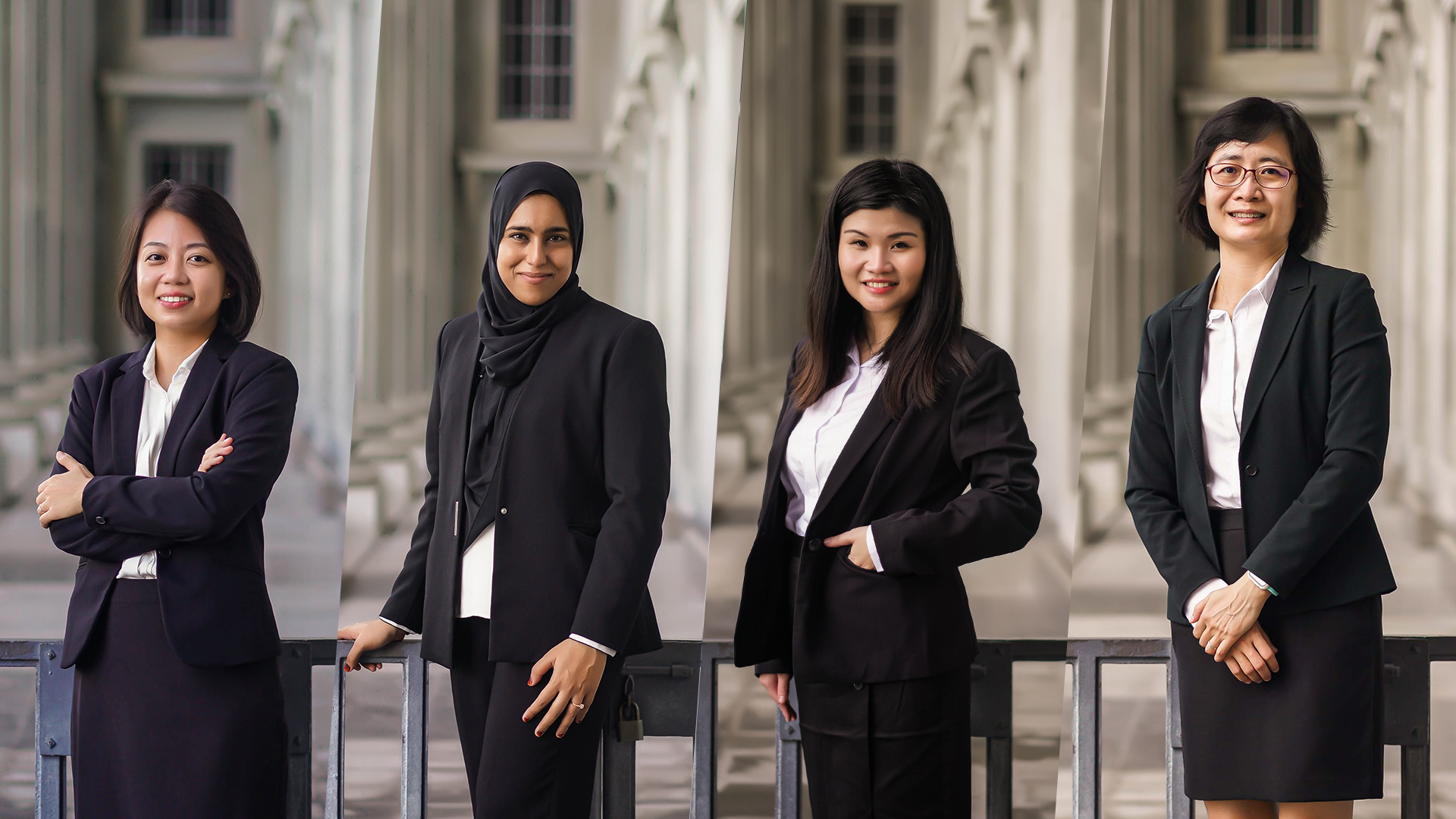 From left: Xin Hui, Latifah, Rae-Anne and Lynette
From left: Xin Hui, Latifah, Rae-Anne and Lynette
Becoming a Specialist
At LAB, Legal Officers (LO) are assisted by a team of 20 Legal Executives (LE), who are equivalent to paralegals in private law firms. The LEs undertake a wide variety of work, from taking instructions from applicants for legal aid and managing their cases, to drafting straightforward court documents.
Typically, only lawyers would be able to handle cases in court. But thanks to the Specialist Legal Executive (SLE) scheme, LEs like Xin Hui, Latifah, Rae-Anne and Lynette have the opportunity to offer legal advice and attend court for certain cases.
Based on a set of eligibility criteria, MinLaw’s Director of Legal Aid selects suitable LEs who expressed interest in the scheme to undergo training as SLEs. The quartet formed the pioneer batch of SLEs when they were gazetted in March 2020.
However, the road to their courtroom debut was not without a few challenges, courtesy of an intense training and assessment process prior to their appointment.
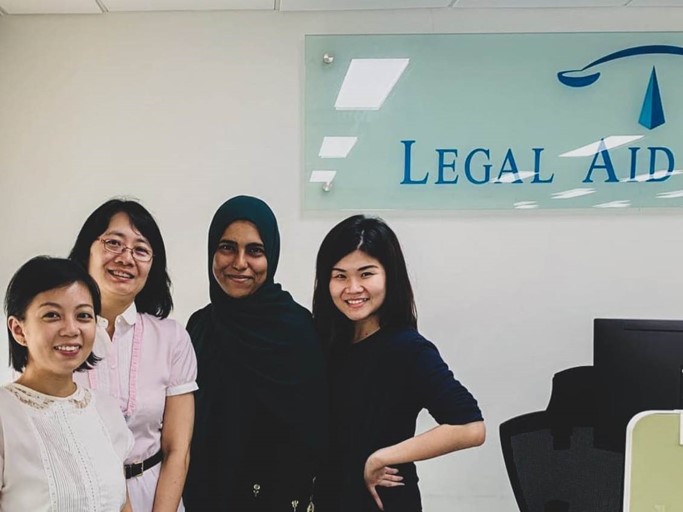 From left: Xin Hui, Lynette, Latifah, and Rae-Anne during the early days of their SLE training. Photo taken before COVID-19.
From left: Xin Hui, Lynette, Latifah, and Rae-Anne during the early days of their SLE training. Photo taken before COVID-19.
Back to School
Lectures, in-class and written assignments, and role-play sessions underpinned their SLE training. A cycle that may be familiar to most during schooling days.
The role-play training sessions and assessments were set out to hone their advocacy and mediation skills. Based on the scenarios of LAB’s existing cases, the SLEs would find themselves in mock court mediation sessions with their trainers who act either as their client, opposing party or the judge. The practical assessments were graded by external assessors, made up of LAB’s ex-legal officers, lawyers from LAB’s panel of assigned solicitors, and judges from the Family Justice Courts.
Their assignments, on the other hand, were based on divorce law and procedure, requiring a minimum score of 70 out of 100 marks for a ‘pass’. After each assessment, the SLEs also had opportunities to discuss their responses with their trainers and learn from mistakes.
“The process was very rigorous and we were definitely held to high standards. I think the journey is not just about picking up legal knowledge and mediation advocacy skills – it helped us to build our confidence in dealing with applicants and opposing parties on our own as well,” shares Xin Hui.
In its own way, the arduous training brought the pioneer batch together. After each milestone, they would reflect and share their thoughts as a group, including case insights and tips on handling a particular applicant or judge.
When some struggled at different times to juggle various responsibilities, be it at work or at home, the team also gave each other emotional support to tide through the training process. After all, a team that grows together, stays together.
The Fantastic Four
While Rae-Anne is currently a final year law student at the Singapore University of Social Sciences, this was not her first foray into law, as she holds a Bachelor of Laws as her first degree from an overseas university. For admission to the Singapore Bar, she took a leap of faith to go through law school again for her Juris Doctor in Law.
“Having to cope with studies and work was challenging on many fronts. To say that law school is tough is an understatement – the sudden transition from spending free time with my friends and loved ones during weekends to one where I was pre-occupied mostly with my readings, books and just being so physically drained due to the demands of law school was a difficult adjustment at first,” shared Rae-Anne.
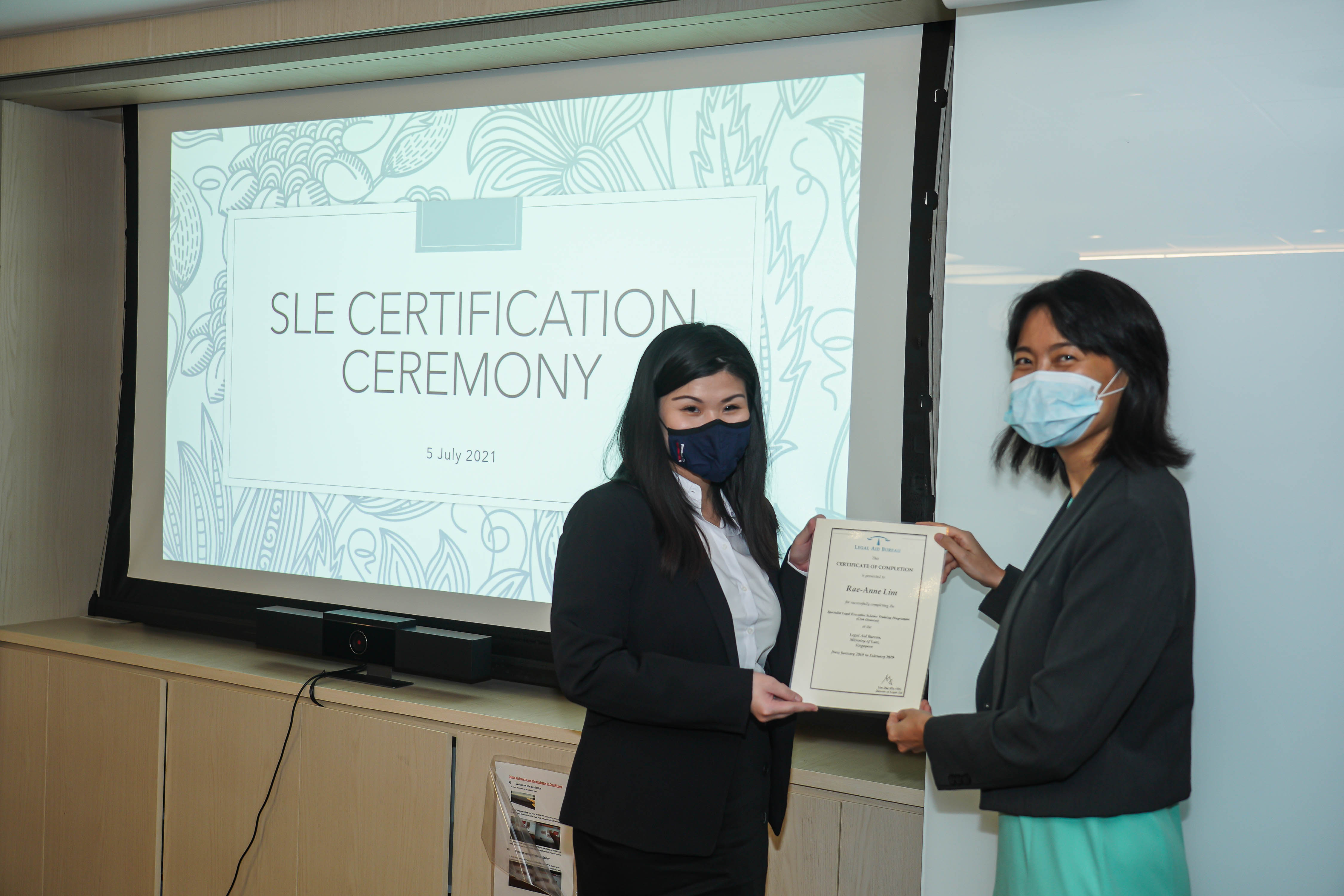 Rae-Anne (left) receiving her certificate from the Director of Legal Aid at MinLaw, Lim Hui Min, at the SLE Certification Ceremony in July 2021
Rae-Anne (left) receiving her certificate from the Director of Legal Aid at MinLaw, Lim Hui Min, at the SLE Certification Ceremony in July 2021
Xin Hui is similarly familiar with the demands of school, but from a completely different perspective as a former Chinese Language teacher in a junior college. She was also a court interpreter prior to joining LAB. After numerous interactions with members of the public and lawyers, she wanted to deepen her understanding in this field. Describing herself as someone who is restless and prefers to get challenged to step out of her comfort zone, she decided that LAB would be a good fit for her interests.
Latifah was also looking for a challenge. As a paralegal in a local firm who mainly dealt with divorce cases, she wanted to work on other forms of civil law and draft more complex court documents. She decided to make the switch to LAB when she saw opportunities to gain experience and contribute in the public sector.
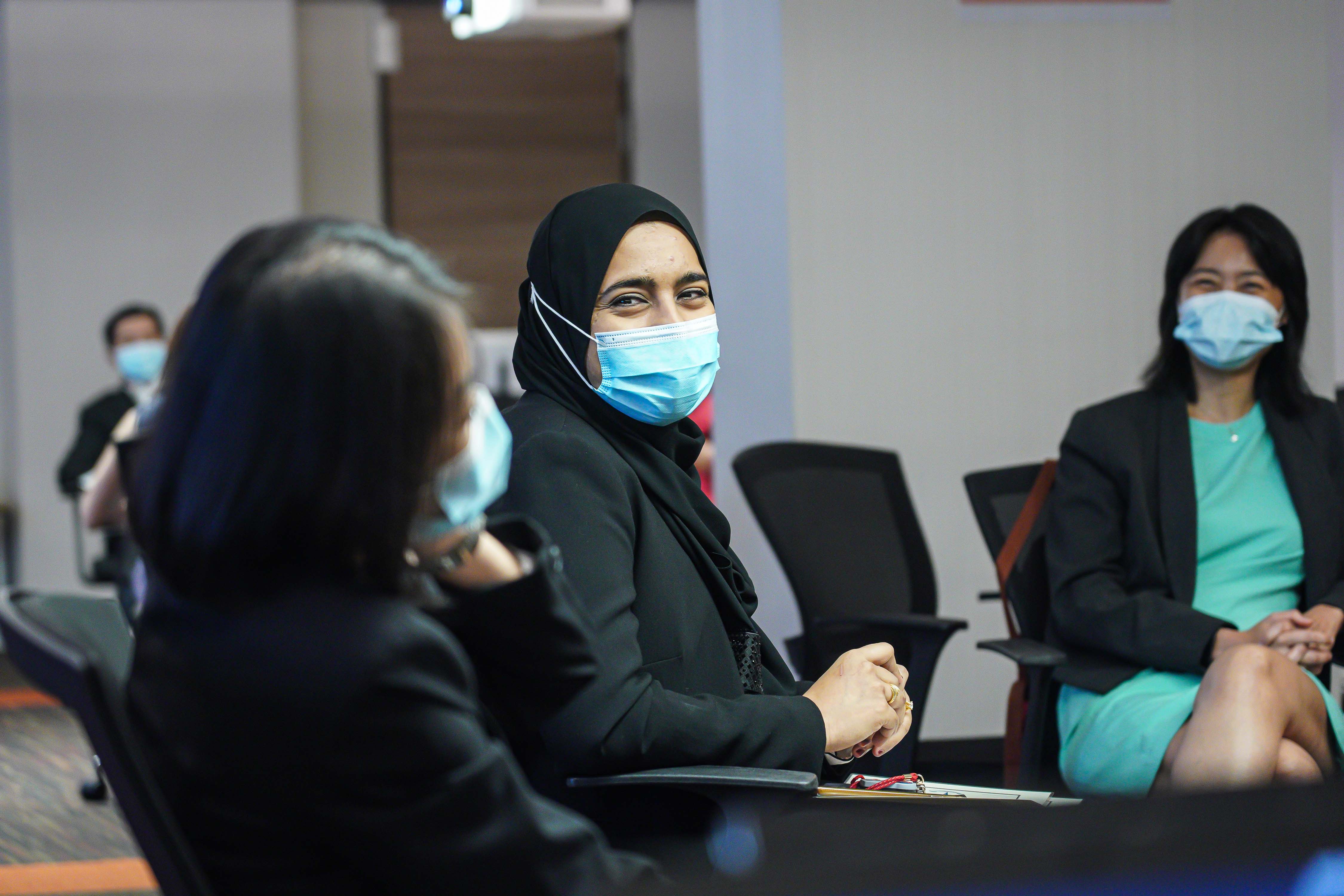 Latifah sharing her thoughts on the training during the SLE Certification Ceremony in July 2021
Latifah sharing her thoughts on the training during the SLE Certification Ceremony in July 2021
Lynette, meanwhile, was a civil service veteran of sorts, having been an LE in LAB for eight years before leaving to pursue a law degree. Her curiosity then led her to practise law in a private firm, but she felt she could do more. That was when she decided to return to LAB – find out more about the work that Lynette does here.
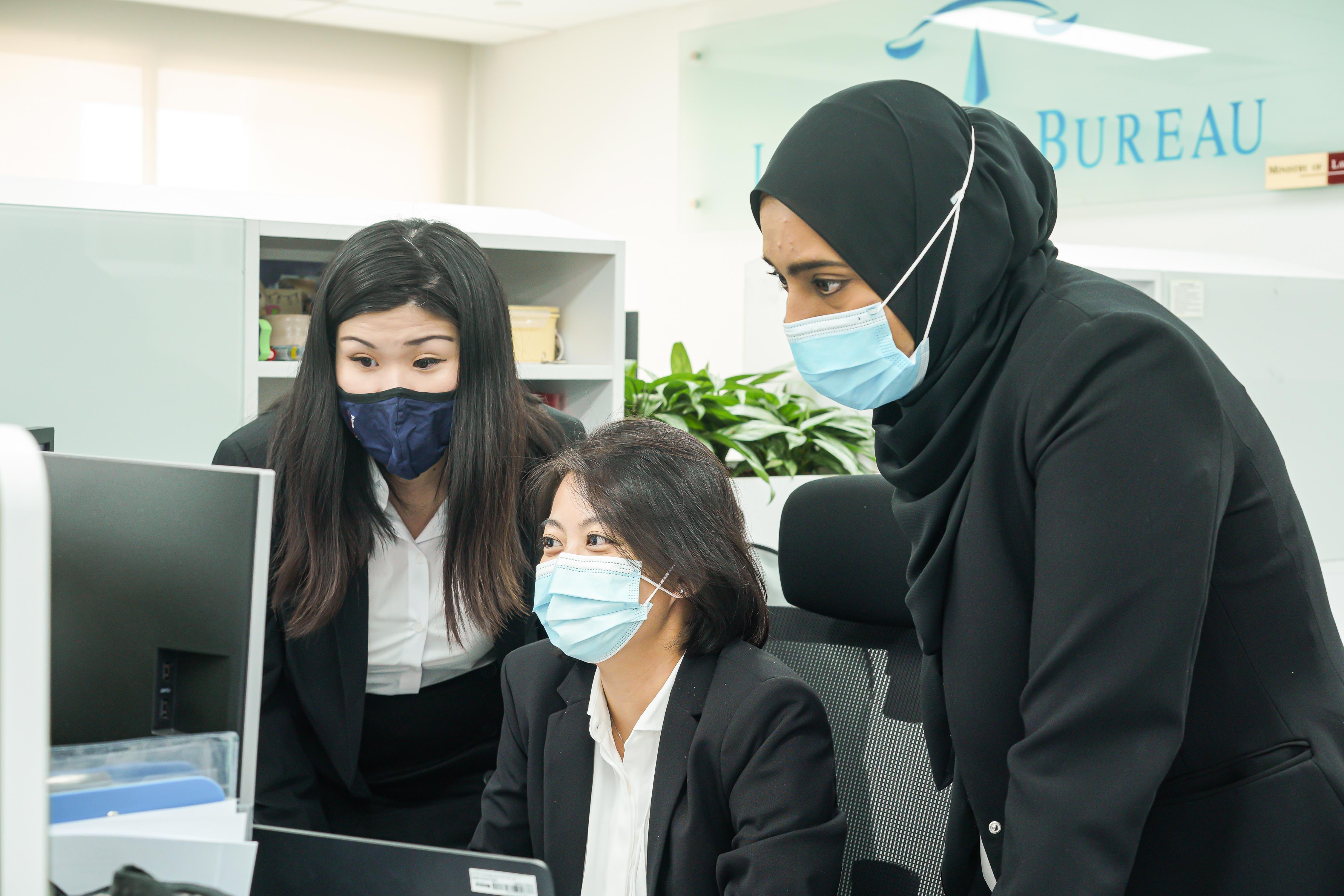 From left: Rae-Anne, Xin Hui, and Latifah having a discussion
From left: Rae-Anne, Xin Hui, and Latifah having a discussion
To Care for a Case
The team manages many diverse cases on a day-to-day basis, meeting people from all walks of life, each with their own stories to share. Latifah vividly remembers a guardianship case that she handled as an LE.
As the applicant was terminally ill, she had to visit her in the hospital at night to get her signed consent for her children to be legally handed over to a guardian. During her visit, she dived into a deep conversation with the applicant who reflected on her life choices, and expressed how much she loved her children despite other lingering issues.
The very next night, the applicant had passed away.
“She was just a few years older than me. This case affected me because I was the last person she met to formalise her final arrangements for her children before she died, and it was fate that allowed me to give her some closure just in time,” said Latifah.
Rae-Anne, too, shared a similar experience for a divorce case that was scheduled for mediation. During the first mediation session, both parties managed to reach an agreement on the grounds for divorce and a second session was fixed a few weeks later.
However, a few days before the second session, they had received news from the lawyers of the opposing party that their client had suddenly collapsed and passed away. Both Rae-Anne and her supervising LO were taken aback by this unfortunate turn of events, especially since the opposing party seemed to be in good health when they first met.
Events like this remind Rae-Anne and her team of the fleeting nature of life, and how everybody is fighting their own battles.
It only serves to spur on the SLEs in their ultimate mission – to represent the vulnerable and help them to get access to justice.
About the SLE Scheme
Under the SLE scheme, selected LEs are gazetted as SLEs to handle uncontested civil divorce cases where the gross value of the matrimonial assets does not exceed S$1 million, and where the opposing party does not participate in the proceedings or where parties are likely to reach an agreement on the divorce and the ancillary matters. The SLEs are allowed to give legal advice to, and attend court for, applicants in such cases. This provides selected LEs with the opportunity to take on higher-level work, while freeing up LOs for more complex casework – thus enabling all LAB officers to develop professionally.
Since March 2021, LAB has also expanded the SLE scheme to include certain types of uncontested probate and letters of administration cases, as well as certain types of Syariah Court divorce cases. LAB will continue to review the scheme and provide rigorous training to our SLEs so that they can serve our applicants in a meaningful way, develop themselves professionally and contribute to the success of LAB.
Last updated on 27 July 2021
Other stories you may like:
In Conversation with: Justice Judith Prakash
Tech-ing on a Better Tomorrow

